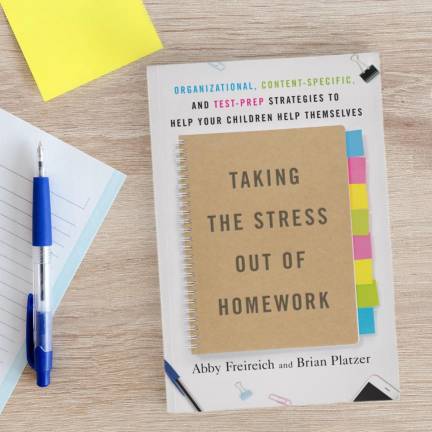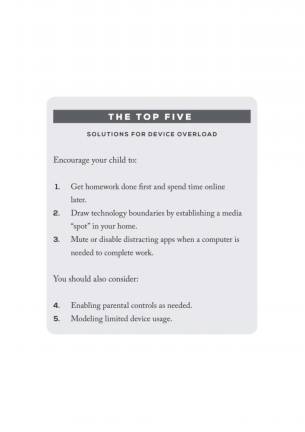When the pandemic shuttered schools, parents were forced to take a crash course in navigating their children’s curriculum and study habits. During this harrowing time, Brian Platzer has coauthored a comprehensive guide to lessen the daunting learning curve that has been imposed upon families. His new book, “Taking the Stress Out of Homework,” offers professional counsel on handling such issues as the propensity towards procrastination and the omnipresent distraction of smartphones, while explaining the importance of actions like setting routines and staying organized. “Kids’ education is now a part of daily life for parents, so there’s especially an interest in the strategies our book offers at this time,” he explained. “Parents are so overwhelmed by their own lives, their children’s academic lives, and how inextricably intertwined the two have become.”
The eighth grade English teacher at Grace Church School penned this invaluable resource, which will be available on March 2, with his colleague Abby Freireich. The pair founded NYC Teachers Who Tutor, the first and only tutoring company in the city staffed solely with classroom teachers who hold master’s degrees. A Greenwich Village native with an MFA from the Johns Hopkins Writing Seminars, and a BA from Columbia University, Platzer began his teaching career in Manhattan after returning to the city upon the completion of his studies. He got a job at Grace, his alma mater — and now the school his two children attend — which inadvertently paved the way for his next venture. “I picked up some tutoring clients along the way and noticed that of all of the students in my class who were receiving outside help, those who tended to become independent, autonomous leaners most quickly were working with professional classroom teachers,” he explained.
Platzer’s diversified resume also includes writing a weekly education advice column with Freireich in “The Atlantic” and authoring two novels, “Bed-Stuy is Burning,” a nod to his neighborhood, and “The Body Politic,” which was inspired by his chronic dizziness.
How much help should parents be providing? In the book, you stated, “A parent’s fingers should never touch the paper, pencil or keyboard.” My mom’s a teacher and always says that you should never write on a child’s homework.
Your mother was ahead of the curve. That’s absolutely right. Parents feel, especially when their kids are frustrated, such an overwhelming desire to alleviate that frustration, that their instinct is just to sort of get in there and do the work with their children. And often that can be counterproductive, because the children then become reliant on that help from their parents. So what we strongly believe, Abby and I, is that a parent doesn’t need to be a content specialist. A parent shouldn’t be in there trying to explain why the quadratic equation works like that. What a parent can do is help set routines, structures and expectations to make the child feel more independent. So a parent can, for example, buy their kid a calendar and explain how, if you have a long-term assignment, it can be beneficial to break up that long assignment into smaller chunks.
You also speak about how self-advocacy is one of the most important skills your child can learn. Explain why that is.
What is striking in interacting with so many parents and students, is the lack of knowledge that the first step in almost every problem could be solved by having an honest one-on-one conversation with the teacher. Self-advocacy can mean a lot of different things, but it almost always means that when you’re struggling or you don’t understand something, just to take that extra moment to go up to a teacher and say, “Hey, do you mind explaining it further?”
In the book, you also give tips regarding device overload.
That is especially complicated at this moment, during the pandemic, when not only are so many people doing their academic work over computers or tablets, but so much of their socializing as well. From a parents’ perspective, it’s so hard to say, “No, you spent all day on the computer, you’re not allowed to play the video game, be on social media or in a chat with friends,” when that’s the outlet after school where kids are able to socialize and relax. We feel strongly that it’s important to discuss and establish rules ahead of time. A lot of the antagonism between kids and parents about screen time comes when parents wait until they’re pleading for more iPad time, and that’s when the parents are saying, “No.” So if you establish ahead of time that you can play one game for half an hour until a timer goes off, that can really help.
I thought it was great that you spoke about the importance of annotating in a physical text.
Annotating is a way to become an active reader and engage with the text as a participant as opposed to just a passive receiver of information. Where it gets tricky in the middle and high school levels is teachers sometimes tell students to annotate, and then students feel the pressure almost after they’ve done their reading, to go back and underline stuff and act as though they annotated when they read. We recommend students do the least amount of annotating possible that lets them retain information and have an active relationship with the text. So maybe that’s circling or putting an exclamation point next to a passage or asking a question about a character like, “Why would she do this?” Or maybe it’s saying at the end of the chapter, one sentence about what happened and then a guess about what might happen moving forward.
As for the test-prep section, you tackle the question of whether to use books, classes or private tutoring.
This question is, unfortunately, primarily a budgetary one. Because the differences are so extraordinary in cost, from either taking a test-prep book out from the library or buying it online, versus a class, versus private tutoring. In terms of a workbook by itself, it can be a great tool, as long as there is somebody else at home who can backfill. Our general approach is that if there is somebody at home who can help you through a book and money is an issue, as it is for almost everyone, then a book is really okay and can lead to a comparable boost in score. Similarly, if a student is willing to make the most of a class, then a class is really sufficient. Finally, if a student needs more support and the financial resources are there, then having a specialist on the test work one-on-one with your child is invaluable.
To learn more about Brian’s work, visit www.brianplatzer.com


